Hi, I'm Remee, and I've often struggled with my weight and sense of body image.
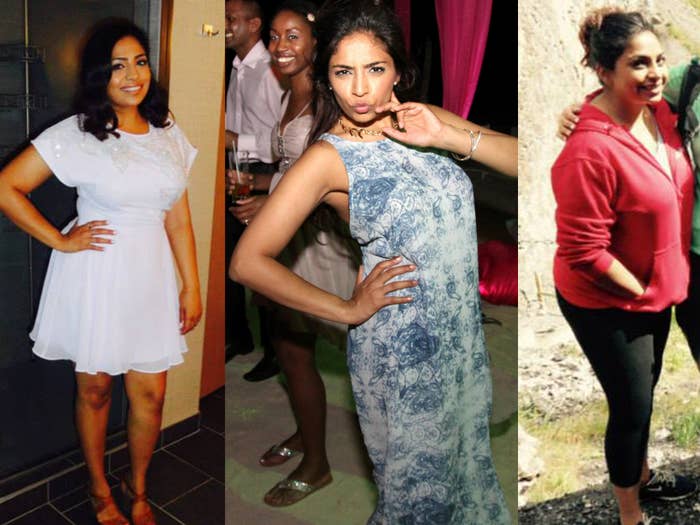
Food has been a source of undeniable pleasure to me my whole life, but it's also been one of conflict. I grew up in a South Asian family where you must always eat whatever delicious thing has been made for you, it's rude not to, but you also must not be "fat". Because of this confusing and emotional relationship with food, I've yo-yo dieted and exercised on and off since my early teens.
I also have this false perception of myself as a healthy eater, so I get frustrated when I feel like my body feels out of shape and lethargic. It only takes a "typical" day (workout and non-workout) written down to see where I'm going wrong.
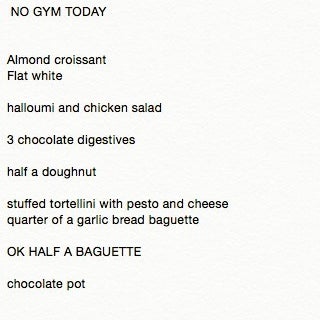

I definitely eat a lot of processed foods unconsciously, and in terms of exercise, I usually go through random phases of doing spinning and boxing classes for a couple of weeks and then nothing at all for a few weeks after that, before the cycle starts all over again. With my 30th birthday approaching I wanted to create better habits, become more active, make more intentional choices about my diet, get stronger, and change my body composition in a way that would make me feel more confident about myself.
So, because I wanted to be mean and lean but I'm prone to being inconsistent, I decided to reach out and get a personal trainer who would have no time for my shit. I got in touch with Evolve Fit London, which specialises in 12-week muscle-building transformations like the one below.
Disclaimer: I did this because I wanted to feel better about my own health and fitness levels, but I also wanted to lose fat and build muscle. I chose to do this for my own personal goals and desires, but in no way am I defining what fitness or beauty or health goals should be for others. Also, as you'll see, this required extreme lifestyle changes that might not be for everyone. And always consult your physician before making any drastic changes to your diet and fitness regimen.

Determined to give it my best shot and become a badass in the gym, I started on a 12-week weightlifting program, focusing on compound movements (exercises that involve more than one muscle group at a time).
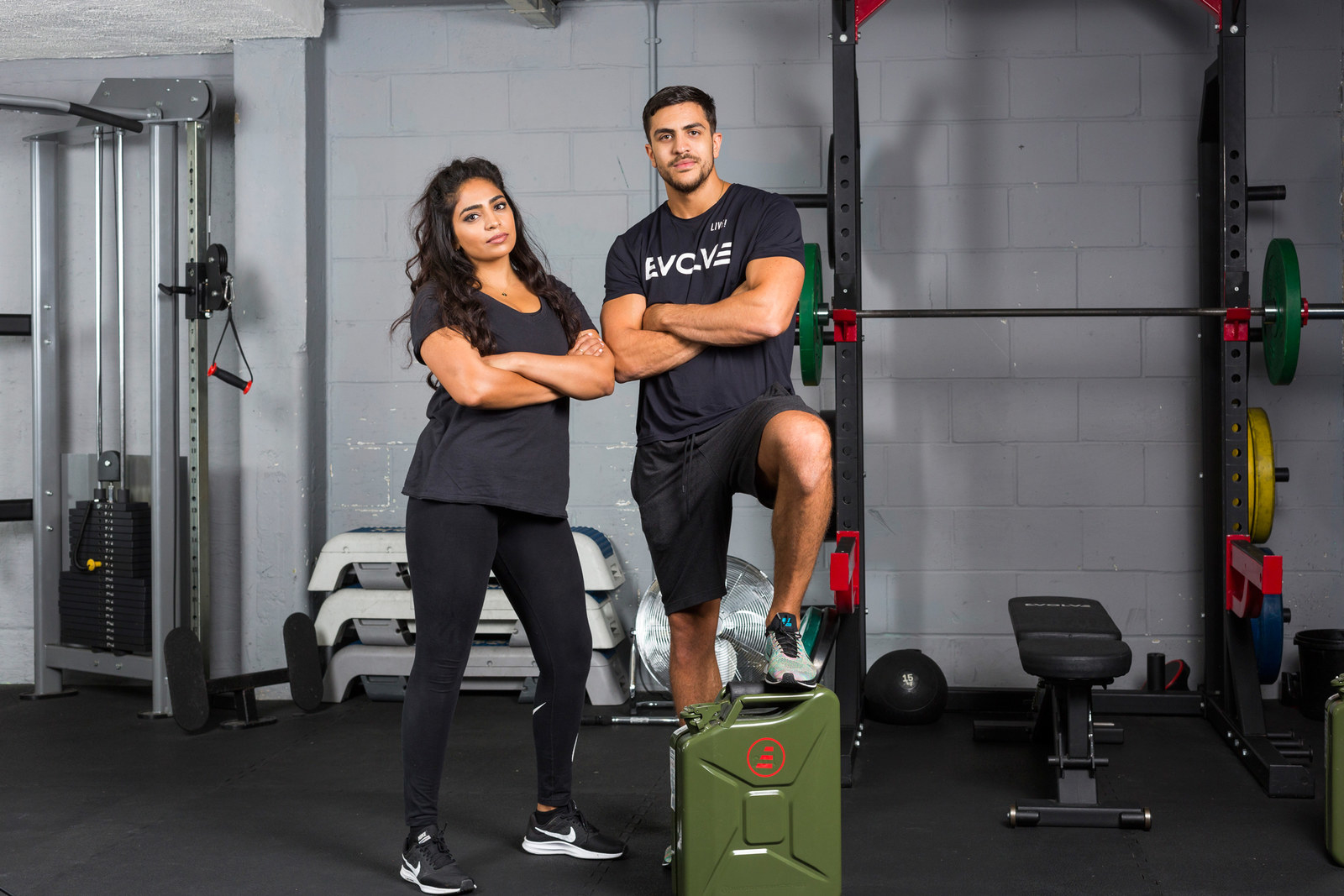
"Compound movements stimulate the most amount of muscles with one movement," my lead trainer Hakim Medfai said. "Simply put, they build more lean mass than isolation exercises." This all sounded great to me. A few big exercises to maximise my workout and get shit done all at the same? Easy.
But once I got introduced to my two new FRENEMIES, the squat and the deadlift, I quickly realised it wasn't going to be easy at all.
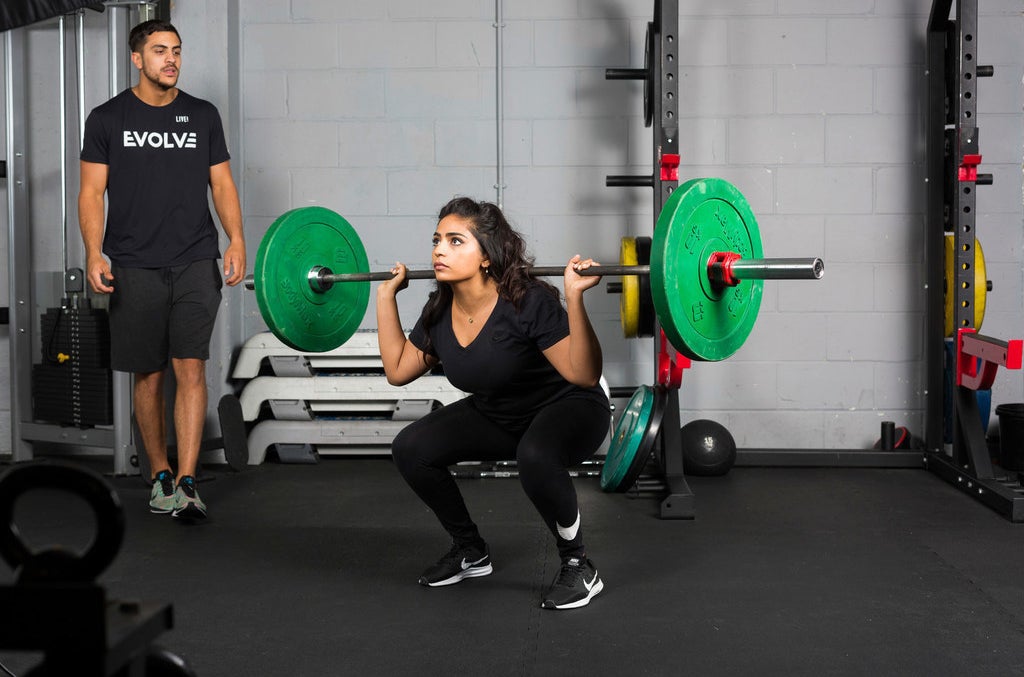
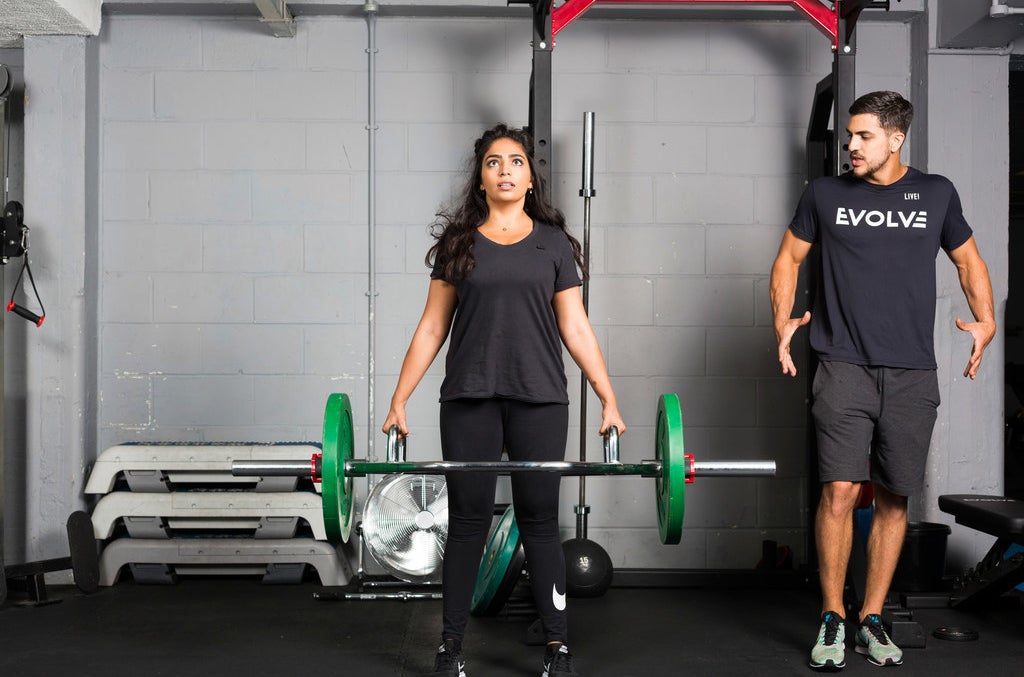
"The squat is potentially the king of compound exercises – it targets the big muscles, such as the glutes and quads, but also nothing works the core better!" said Medfai, and he wasn't kidding. No matter how much I tried to distract myself by imagining that this was what J.Lo does and chanting to myself "I want a big arse, I want a big arse", I couldn't deny that the exercise was an all-round killer, especially now I was doing it properly.
And doing them properly apparently meant getting down low, like when you're in the club and Lil' Jon comes on and you're all like, "Woooo!!!", and you drop it down to the floor, but then you realise you're almost 30 and might not be able to get back up and oh my god what if this weight falls on me and I die. Yeah, that's what it felt like every time.
The deadlift was also just as brutal, probably because, as Medfai said, it "works virtually every muscle in the body but mostly heavily on your 'posterior chain' i.e glutes and hamstrings." However, it was also the exercise in which I saw the most rapid improvement, and although it's quite stressful, it was one I was keen on pushing myself on. At one point I even told my trainer I that I needed more weight instead of giving the usual sad baby face I make whenever they try to test me – which FYI, doesn't work. Personal trainers are ruthless and will only show leniency once it's too late and you're already dead.
The squat and the deadlift weren't completely new exercises to me, but there was one exercise I wasn't familiar with at all, the menacingly named "prowler" – essentially a sled stacked with weights (or your trainer) that you push and pull as quickly as possible across a certain distance.
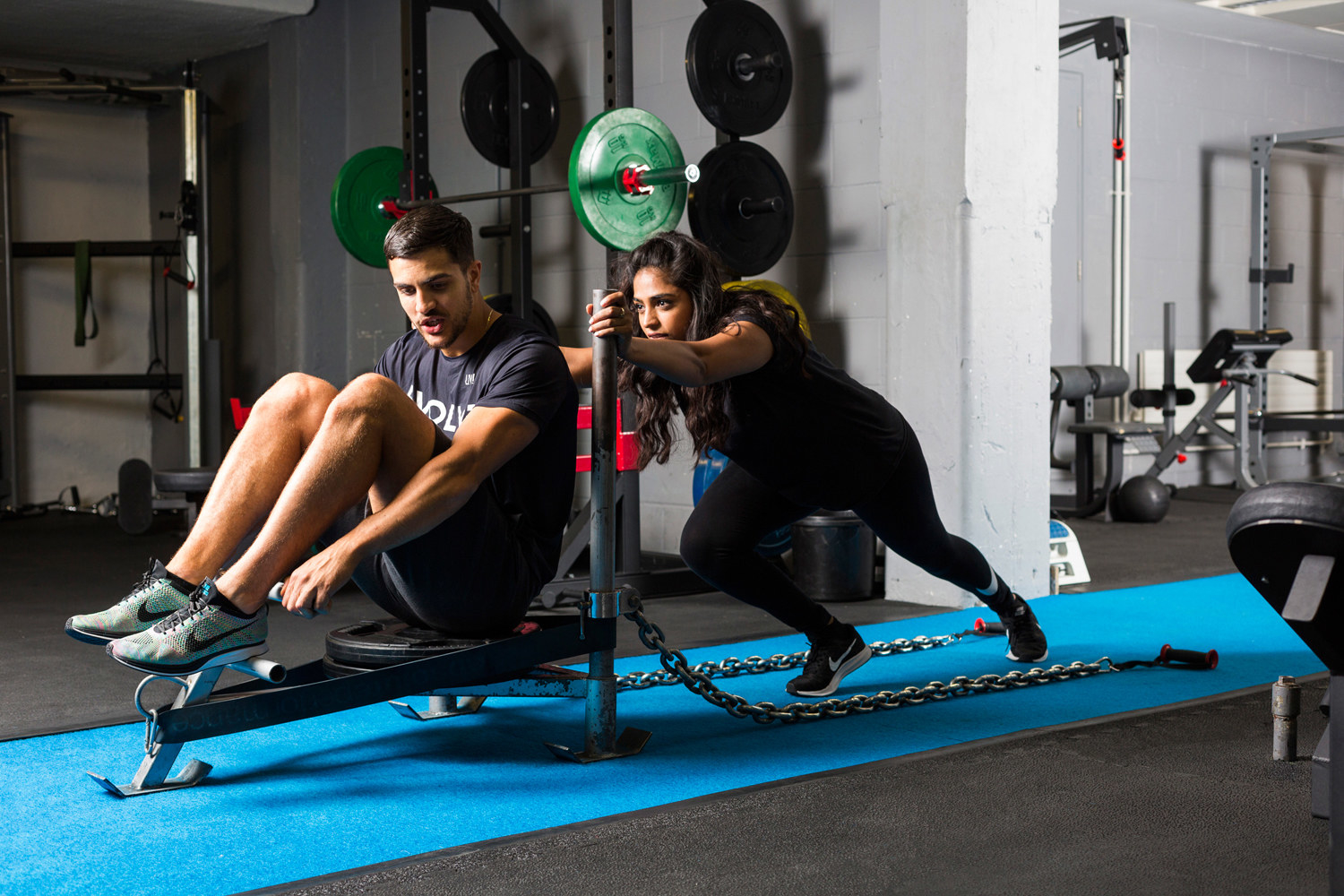
Aside from these, there were other weight-based exercises we did (medicine ball slams, lateral arm raises, HIIT circuits), and the focus changed every session (one day would be legs, one would be arms, one would be chest and back, etc). But the prowler was pretty much inescapable and was used in practically every session. It's often used as what the gym calls a "finisher" exercise – yep, intended to finish you off.
At first I was intimidated by the program and its absolute commitment to getting ripped, especially since Evolve's clientele was mostly men.
I was worried that I wasn't going to achieve results in the same way its previous clients had, because I was well aware that due to being a woman and having lower levels of testosterone than the average man, I was very unlikely to build as much muscle mass. Evolve assured me that although this was true, it wouldn't mean I couldn't achieve a big change in my body composition or fitness levels, and said weight-training was the fastest route to that regardless.
"Running burns calories, and yoga will improve your mobility, but nothing transforms the physique quite like weight training," said Medfai. "It is the key to lasting results, not to mention the multitude of health and hormonal benefits of being strong."
And I clearly had no idea what I was really signing up to. I always thought weightlifting seemed slower-paced and less intense than cardio, but jfc how I was wrong.
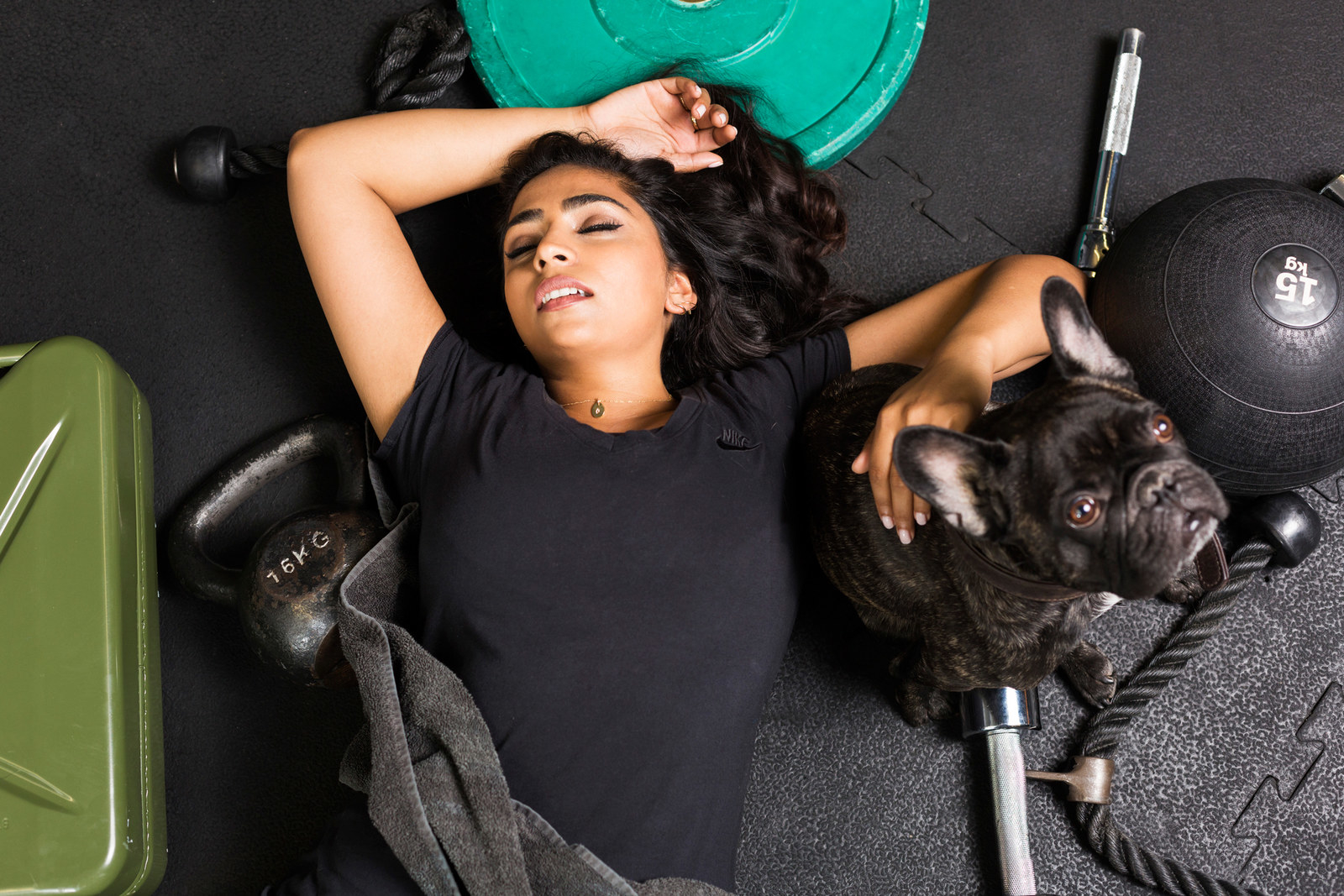
The program meant I had to train three times a week in the MORNING before work for the first month, graduating to FOUR times a week thereafter. And even though I was pushing myself every session, it didn't seem to get easier at any point, which made me think, How do I know if I'm getting fitter if I feel tired and weak all of the time?
So, a month in, I decided give myself a challenge outside of the sessions to test if my fitness had improved. I signed up to Tough Mudder, because I have a death wish and, as you know, I'm prone to false perceptions of myself. This is me during the final obstacle. Stay humble, guys.
As embarrassing as this looks and was (thank you to my best mate, her husband, her husband's mate, and the seven kind strangers who helped drag my limp arse over the ramp), when I really think about it I'd already achieved two things I never thought I'd ever do – sign myself up to a physically intensive race and actually complete it.
Feeling pretty proud of myself, I powered through the remaining two months of training.
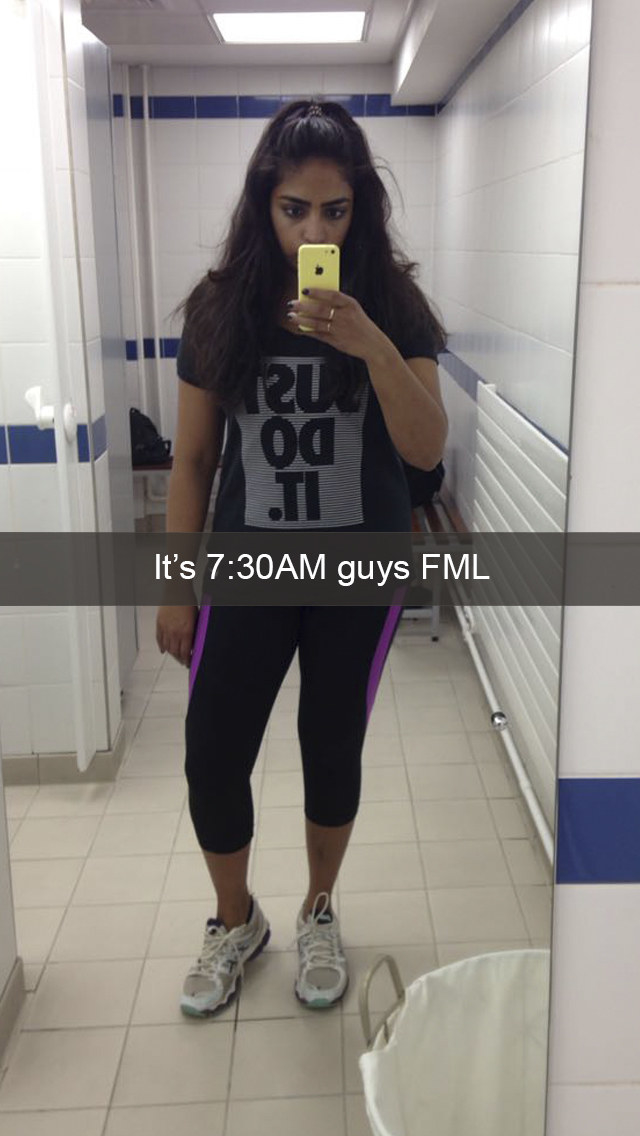
I'm not exaggerating when I tell you this program did not get any easier even after my Tough Mudder "glory". Six weeks in, it felt like the gym was starting to taking over my entire life – I was tired constantly and I even caught a cold several times (in the summer!!), presumably because my immune system was quite low. When I relayed this to one of the trainers on the program, they said it was normal at about the halfway point because I was putting my body through a complete health overhaul and a lot of stress, but also that stress is actually necessary to the body's transformation process.
With regards to improvement, they only had to show me how they'd been upping my weights week by week, so even if I didn't feel like I was getting stronger, I actually was. It was also comforting to know that the trainers themselves (who were all big, strong, six-pack-adorned blokes) often felt the same way as I did when training, and that contrary to popular belief, you're not supposed to look good training, you're supposed to look like you're losing the will to live and/or about to shit your pants. Essentially, the key to training in the gym is to train outside your comfort zone, otherwise your body adapts very quickly and won't change.

Of course, even if you're training 3-4 times a week like an absolute boss, if you're looking to make big-time body composition changes you have to change your diet significantly (well, at least I did anyway). Here was a typical day of my new eating program:
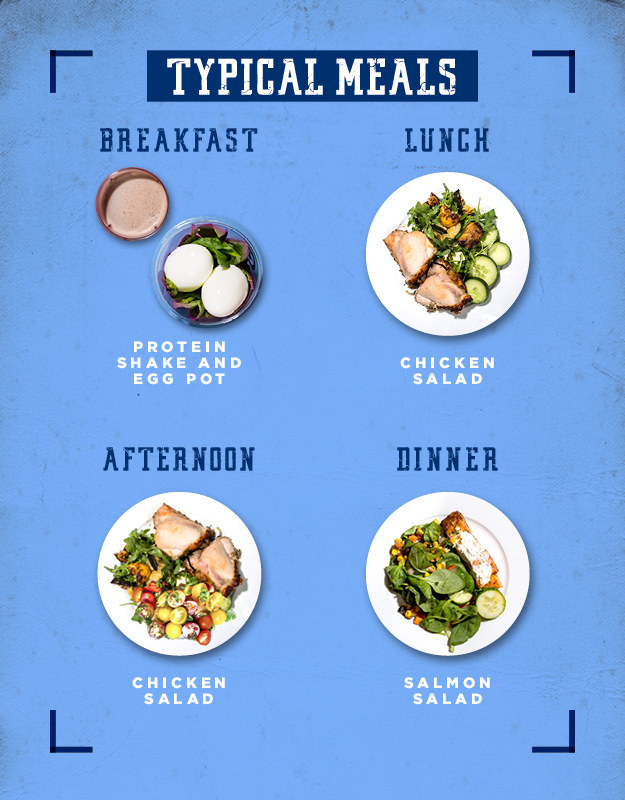
"You can't out-train a bad diet" was the mantra of the gym, which was the worst possible news for a foodie like myself. Killing it in the gym I can do; avoiding mac n' cheese I can't. But I was in it all the way, so as part of the program I was introduced to "carb-cycling", where on different days I would be allowed a different amount of carbs (or none at all), with the rest of my diet primarily consisting of lean meats, healthy fats, and veggies. Chicken and salad became my go-to almost every day. If I thought the training was hard, the diet was even harder.
But there were times where I went off-script, and that was okay.


In fact, it was encouraged by my trainers. When I expressed my annoyance at having several big events and even a holiday in the midst of training, they were right to point out that that was life – you have events and you should enjoy them. You're not going to undo it all by going off-course for a weekend, as long as you get back to your routine after it's done. I've been on diets on and off my whole life, and every time I "fall off the wagon" I feel horrible about myself and eat because I've "eaten too much". With this program, I learned to accept that it's fine to give in to temptation – after all, what's the point in life if you can't have pizza????
Once I got into a routine, I started to find the diet easy to stick to, although the level of snacks available in the office was constantly testing me.

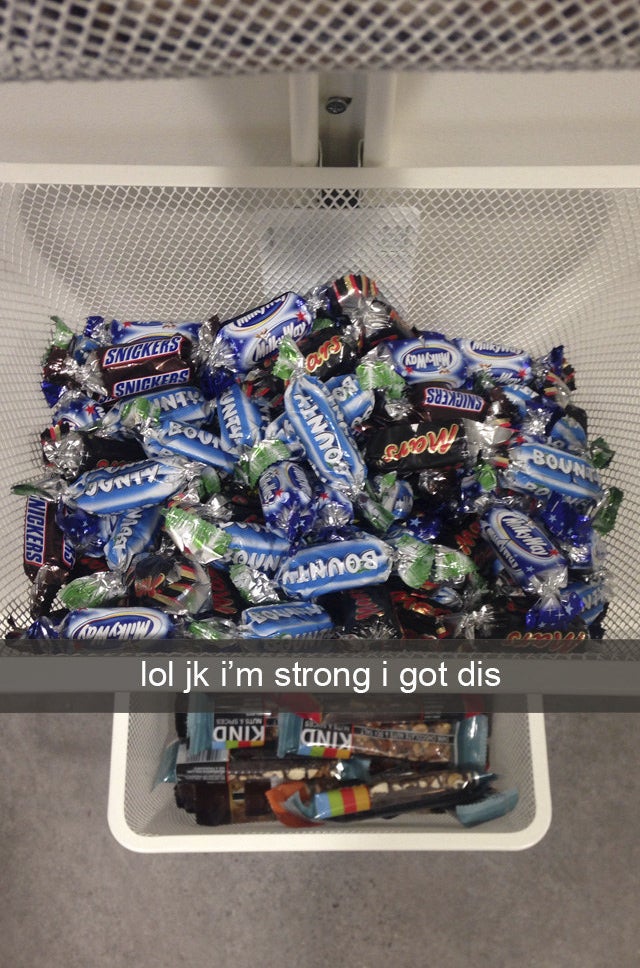

But 24/7 support from my trainer enabled me to stay focused even when I really didn't want to.
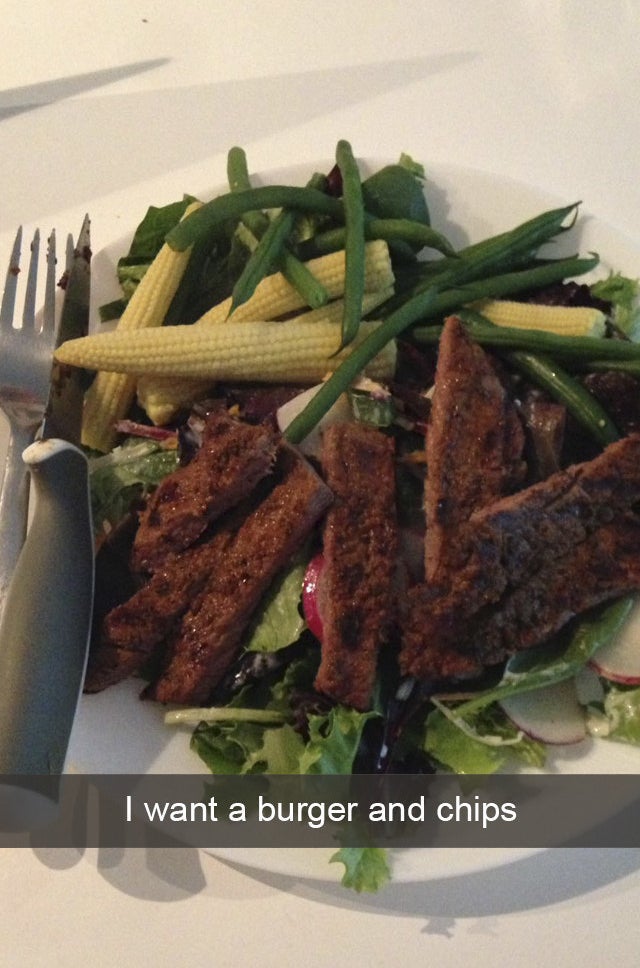


Having to answer to Medfai made me accountable for my actions: Being a people-pleaser, this way of working really appealed to me. I didn't want to let him down, and eventually once I started learning to appreciate myself more, I started thinking about how to not let myself down.

After 12 gruelling weeks it was all over, and I'd transformed in more ways than one.
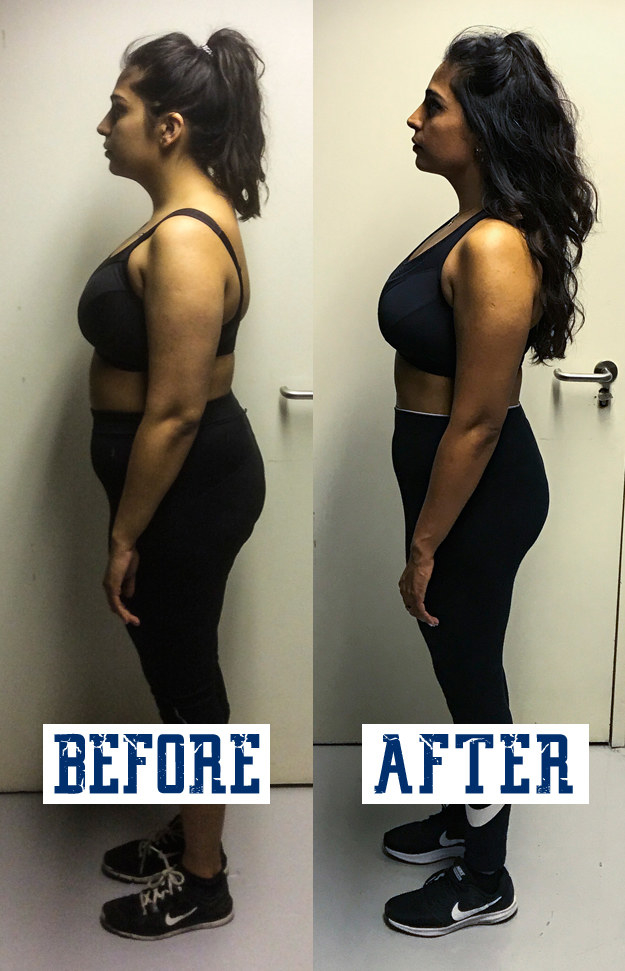
At the start and end of the program, my body composition was carefully assessed to see if I'd achieved my personal goals of increasing lean mass and decreasing body fat:
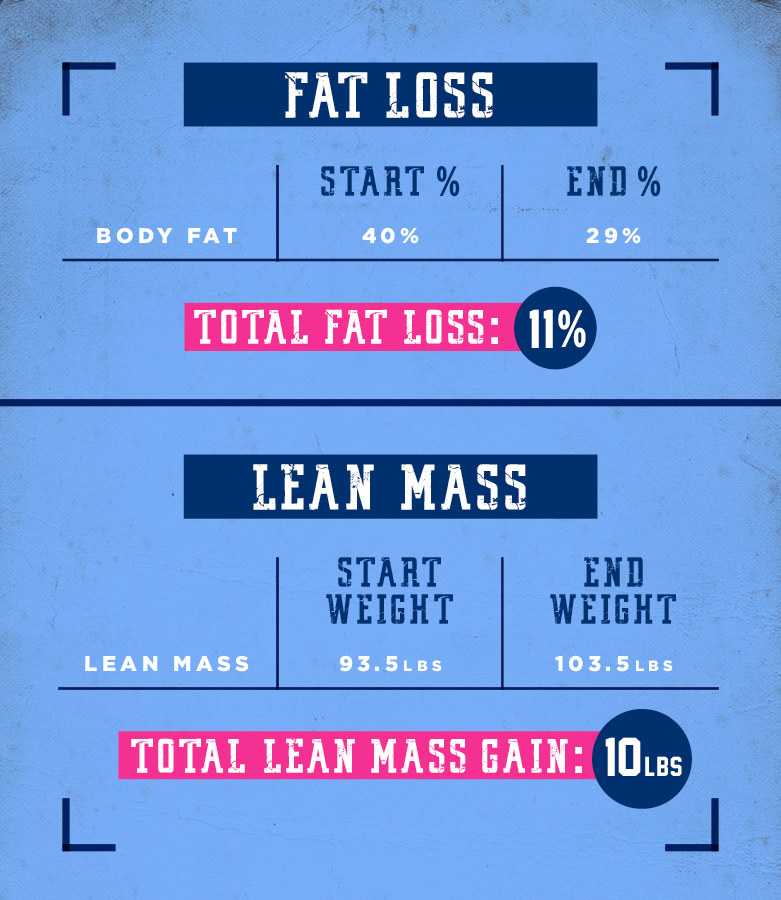
To assess my body fat and lean mass percentages, Medfai used callipers, a larger pincer-like tool that pinches at skin folds on various areas of the body. It was a really fun process.
"We use callipers to calculate the subcutaneous fat underneath the skin," Medfai said. "We then use a mean of five of the most scientifically accurate equations to calculate the percentage of bodyweight that is fat and the percentage that is lean mass."
It's worth noting, though, that all of these results are estimates based on the caliper system and science available. Lean mass does not equate to muscle mass – an increase in lean mass, while certainly including an increase in muscle, will also include water weight.
What I'd been lifting over the program was also tracked to get a tangible idea of how much stronger I'd become:
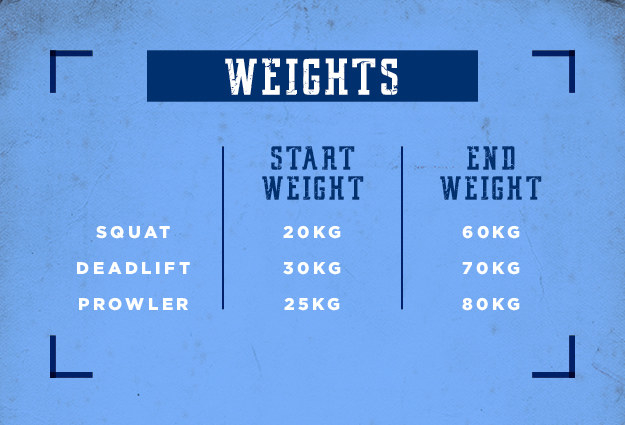
Because I was so busy trying to stay alive in each session, I never really noticed how much heavier I was lifting as the weeks went by. By the end of the three months I'd more than doubled – even tripled – my weights, which made me feel super strong and proud.

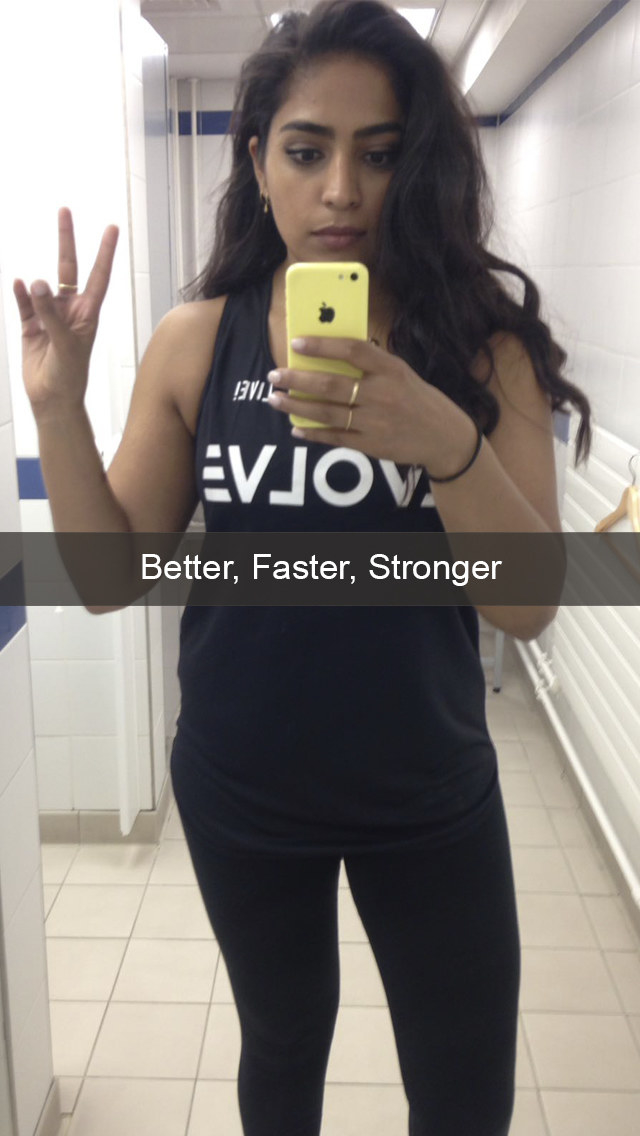
* Strength training was a sustainable way for me to achieve a change in body composition, and it felt super satisfying getting stronger each week. Learning how to do key movements properly (much as it pained me to do so) has made me much more confident in the gym, and now I can walk past gym bros smugly knowing I'm probably doing the exercises better than them.
* The number on the scale is not the be all and end all. Overall, based on weight, I dropped nine pounds, which would normally not feel like much considering how hard I'd been working. But hold up – I gained lean mass? I lost 11% of pure body fat? Yes, I had body composition goals and I'd achieved them, but to be honest I'm kind of more proud that I can actually get off my arse four times a week IN THE MORNING and squat my own bodyweight!
* Being consistent with my training and eating plan taught me patience. I've always yo-yo dieted because I've not seen changes quick enough, or I would have a "cheat day" that turned into a "cheat week". Having to show up to the gym four times a week meant that when I did eat outside of my plan at the weekend, which was totally fine and encouraged, I would immediately get back on track come the Monday. Granted, this particular workout and diet regime is probably not sustainable for me long-term, but what's important is that it's helped me figure out a lifestyle I can actually manage and stick to!
* And I know what you're thinking: Remee, I haven't got money for this! But a personal trainer isn't something you need to commit to as much as I did. If you have the means to do a program like this, I would highly recommend it. It changes your way of thinking completely, and it pushes you to your limits – giving you a massive kick up the arse. If you don't, I would fork out for one or two sessions with someone reputable like Evolve to get a personalised program, because the most important thing when it comes to weight training is doing the right kinds of exercises and doing them properly. Having a trainer or a training group is also about support, but if you don't have one, working out with a friend can make all of the difference (especially if they're bossy), not to mention making the whole process a lot less intimidating and more encouraging.
